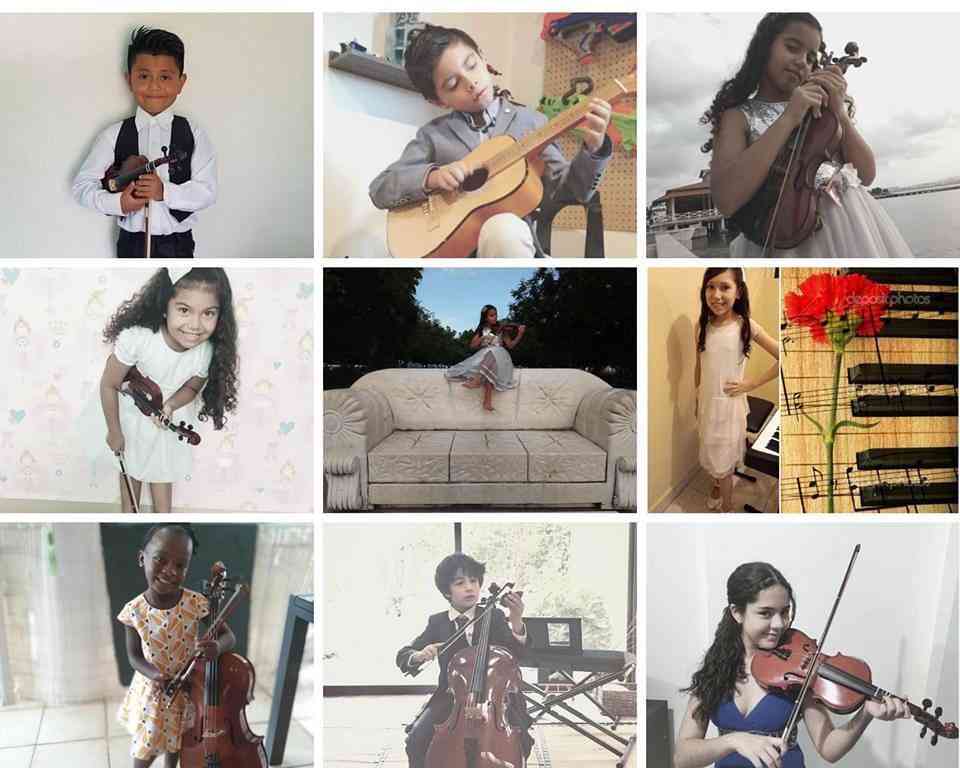
yopracticoencasaAMMS
During the month of May, the Mexican Suzuki Association held the first online international Suzuki practice challenge, #yopracticoencasaAMMS (#ipracticeathomeAMMS), with the participation of various countries such as United States, Canada, Isla de Guadalupe, and Mexico, and a team of 70 collaborators including committees, teachers and coordinators.
This challenge was created under the leadership of Leslie Mizrahi, president of the Mexican Suzuki Association, and executed by yours truly as head of the events committee with the support of teachers Jose Enriquez and Mildred Martinez.
The main goal of the challenge was to encourage daily practice in Mexican Suzuki students, but it also aimed to bring support to all Suzuki teachers and studios throughout the country strengthening bonds, building a community and motivating students in this time of big changes.
To put together this challenge several daily activities were designed aiming to be fun, creative, and energetic, since incorporating play into educational activities sets off processes that tend to increase the student’s knowledge, engagement, and skills.[i] Among the activities performed we may highlight those which were the most liked or the ones that had most impact to the participants: playing in a funny position, playing with eyes closed, performing concerts for friends or family online, practice virtually with classmates of different instruments. There was a different activity for each day of the challenge. I believe that the relationship that exists between learning based on play, the motivation and engagement of the students is something we should take advantage of in our teaching practice. I believe that as teachers of a musical instrument we should not deprive ourselves of the benefits that learning based on play propose. Learning does not have to be boring if we set the goal of “learning by play.”
We also provided instructional capsules for the families of the participating students, which were shared with the objective of developing and strengthening habits and skills. These capsules were made with the participation of renowned teachers in the national and international Suzuki domain.
Another notable aspect of great impact was the incorporation of a virtual practice partner. For that we paired students that would be able to connect with one another, played the same instruments, were approximately the same age, and lived in different cities and countries. This modality had the objective of providing elements that would foment skills such as resilience, perseverance, and positive thinking in the students, since it has been proven that peer tutoring and getting support from older or same age students promotes a more focused work towards the proposed goals.[ii] For this, students presented their pieces to their practice partners, talked about their experience with their instruments, taught new challenges, and remained motivated to get successfully to the end of the 30 days. The results were extraordinary; we know this because people shared great stories about the experience, for instance this mother’s testimony:
“Both of them were looking forward to this moment with excitement and curiosity. They didn’t know how having a virtual partner would work . . . what should they say to each other, what should they ask . . . until the moment came and something magical happened. They started talking as if they had been friends forever! They talked about music, about the songs they knew, they listened to each other and they accompanied each other on the piano. Antonio taught him to play a new song from the book, with blackboard and all! Lulius played for him songs that are not in the book. . . Always through play, jokes and a lot of laughter the hour went by! And they would have continued but the battery ran out!”
When the 30 days of the challenge were through we had the closing event, which consisted of 11 virtual recitals, as well as different masterclasses in each one of the participating instruments: violin, viola, piano, guitar, flute, and cello.
For us, the organizing committee, it was a great pleasure to be part of the first edition of the project #yopracticoencasaAMMS, where students, parents, and teachers stood out in an amazing way, in a moment when despite the complicated circumstances of the lockdown they used this challenge to develop skills making the most of the stay home mandate, transforming moments of boredom and uncertainty into a lot of fun, looking forward to each day with excitement.
A special thank you to the board of directors of the AMMS and the outstanding work of Martha Ceballos, Alda Ortíz y Mariana Lazos in communications, Araceli Lugo in administration, Elías Flores in membership, Susana Manjarrez in academies, Maricarmen Lugo in festivals and Víctor Gardoqui in education.
We wish to continue contributing with leadership and positivity to our Suzuki community in Mexico, since our paramount goal is to add to the successful development of each one of our students, teachers, and academies.
Notes
[i]. Marc I. Cicchino, “Using Game-Based Learning to Foster Critical Thinking in Student Discourse” in Interdisciplinary Journal of Problem-Based Learning 9(2), 2015.
[ii]. Martin Krovetz, “Expecting All Students and Educators to Use the Hearts and Minds Well” in Educational Leadership and Administration: Teaching and Program Development 27 (2016), 231-242.
Durante el mes de mayo la Asociación Mexicana del Método Suzuki llevó a cabo el primer reto de práctica internacional Suzuki en línea, #yopracticoencasaAMMS. El cual contó con la participación de 304 alumnos de varios países como: EE. UU, Cuba, Canadá, la isla de Guadalupe y por supuesto México. Y un equipo de 70 colaboradores entre comités, maestros y coordinadores, donde cabe destacar el valioso apoyo de todos los comités que forman el consejo directivo de la AMMS: comunicación con Martha Ceballos, Alda Ortíz y Mariana Lazos, administración con Araceli Lugo, membresías con Elías Flores, academias con Susana Manjarrez, festivales con Maricarmen Lugo y educación con Victor Gardoqui.
Este reto surgió bajo el gran liderazgo de la presidenta de la AMMS, Leslie Mizrahi, y fue ejecutado por una servidora, como cabeza del comité de eventos. Contando con el destacado apoyo de los profesores Jorge Enríquez y Mildred Martínez. El reto tenía como objetivo principal incentivar la práctica diaria en los alumnos del método Suzuki en México, pero también buscaba apoyar a cada uno de los maestros y academias Suzuki alrededor del país al estrechar lazos, hacer comunidad e incrementar la motivación de los alumnos en esta época de grandes cambios.
Para la realización del reto se diseñaron diferentes actividades diarias que buscaban ser divertidas, creativas y dinámicas. Ya que cuando el juego es utilizado de manera inclusiva dentro de las actividades educativas se activan procesos que tienden a aumentar los conocimientos, el compromiso y las habilidades del estudiante (Cicchino, 2015). De las actividades realizadas podemos destacar algunas que fueron las que más gustaron o impactaron a los participantes: tocar en alguna posición chistosa, tocar con los ojos cerrados, realizar conciertos para amigos o familiares de manera virtual, practicar virtualmente con compañeros de instrumentos diferentes. Hubo una actividad diferente para cada día del reto. Me parece que la relación que existe entre el aprendizaje basado en el juego, la motivación y el compromiso de los estudiantes es algo que debemos aprovechar en nuestra práctica docente. Creo que como maestros de un instrumento musical no debemos privarnos de los beneficios que el aprendizaje basado en el juego propone. El aprendizaje no tiene que ser aburrido si nos trazamos la meta de “aprender jugando”.
Así mismo se realizaron cápsulas educativas para las familias de los alumnos participantes, cápsulas que se compartían con el objetivo de construir y reforzar hábitos y habilidades. Estas cápsulas contaron con la participación de reconocidos maestros en el ámbito Suzuki nacional e internacional.
Otro factor muy destacado, de gran impacto y trascendencia fue la incorporación de un compañero de práctica virtual. Para esto se buscó que los alumnos pudieran conectarse entre sí cuidando que practicaran el mismo instrumento, que tuvieran más o menos la misma edad y que vivieran en diferentes ciudades y países. Esto se hizo con el objetivo de proporcionar factores que contribuyeran a fomentar habilidades como la resiliencia, la perseverancia y una mentalidad positiva en los alumnos, pues se ha demostrado que la tutoría entre pares, ya sea al recibir apoyo de estudiantes de mayor edad o de la misma edad, contribuye a que los estudiantes trabajen de una manera enfocada en el logro de los objetivos propuestos (Krovetz, 2016). Para esto los alumnos presentaban sus piezas a sus compañeros de práctica, hablaban de su experiencia con el instrumento, enseñaban nuevos retos y se mantenían motivados para llegar al final de los 30 días con éxito. Los resultados fueron extraordinarios, lo sabemos porque nos compartieron grandes historias de esta experiencia, por ejemplo, el siguiente testimonio de una madre:
“Los dos esperaban este momento con emoción, con curiosidad. No sabían como era esto de tener un compañero virtual…que se iban a decir, a preguntar…hasta que llegó el momento y algo mágico sucedió. ¡Empezaron a platicar como si hubieran sido amigos desde siempre! Hablaron de música, de las canciones que se sabían, se escucharon y se acompañaron en el piano. Antonio le enseñó tocar una canción nueva del libro, con todo y el pizarrón! Lulius le tocó canciones que no están en el libro… ¡Siempre a través del juego, de las bromas y muchas carcajadas se fue la hora! ¡Y este cuento no se hubiera terminado si la batería no se hubiera acabado!”
Al finalizar los 30 días del reto se llevó a cabo el evento de clausura que consistió en 11 recitales de manera virtual, así como la realización de diferentes clases magistrales en cada uno de los instrumentos participantes: violín, viola, piano, guitarra, batería, flauta y violonchelo
Para nosotros, el comité realizador del reto, fue un gusto muy grande poder ser parte de la primera edición del proyecto #yopracticoencasaAMMS, donde los alumnos, padres y maestros destacaron de una manera increíble. En un momento donde a pesar de las circunstancias complicadas de la cuarentena, utilizaron este reto para construir habilidades y aprovechar al máximo el momento de quedarse en casa, cambiando momentos de aburrimiento e incertidumbre por mucha diversión, esperando cada día con ilusión.
Esperamos seguir contribuyendo con liderazgo y de manera positiva con nuestra comunidad Suzuki en México ya que nuestro objetivo primordial es aportar al desarrollo exitoso de cada uno de nuestros alumnos, maestros y academias.
Bibliografía:
Marc I. Cicchino. Using Game-Based Learning to Foster Critical Thinking in Student Discourse.
Interdisciplinary Journal of Problem-Based Learning, 9(2), 2015.
Frank M. Diaz. Intrinsic and Extrinsic Motivation among Collegiate Instrumentalists. Contributions to Music Education Vol.37, No. 1, pp. 23-35. 2010.
Krovetz, M. (2016). Expecting All Students and Educators to Use the Hearts and Minds Well.
Educational Leadership And Administration: Teaching And Program Development, 27 231-242.








